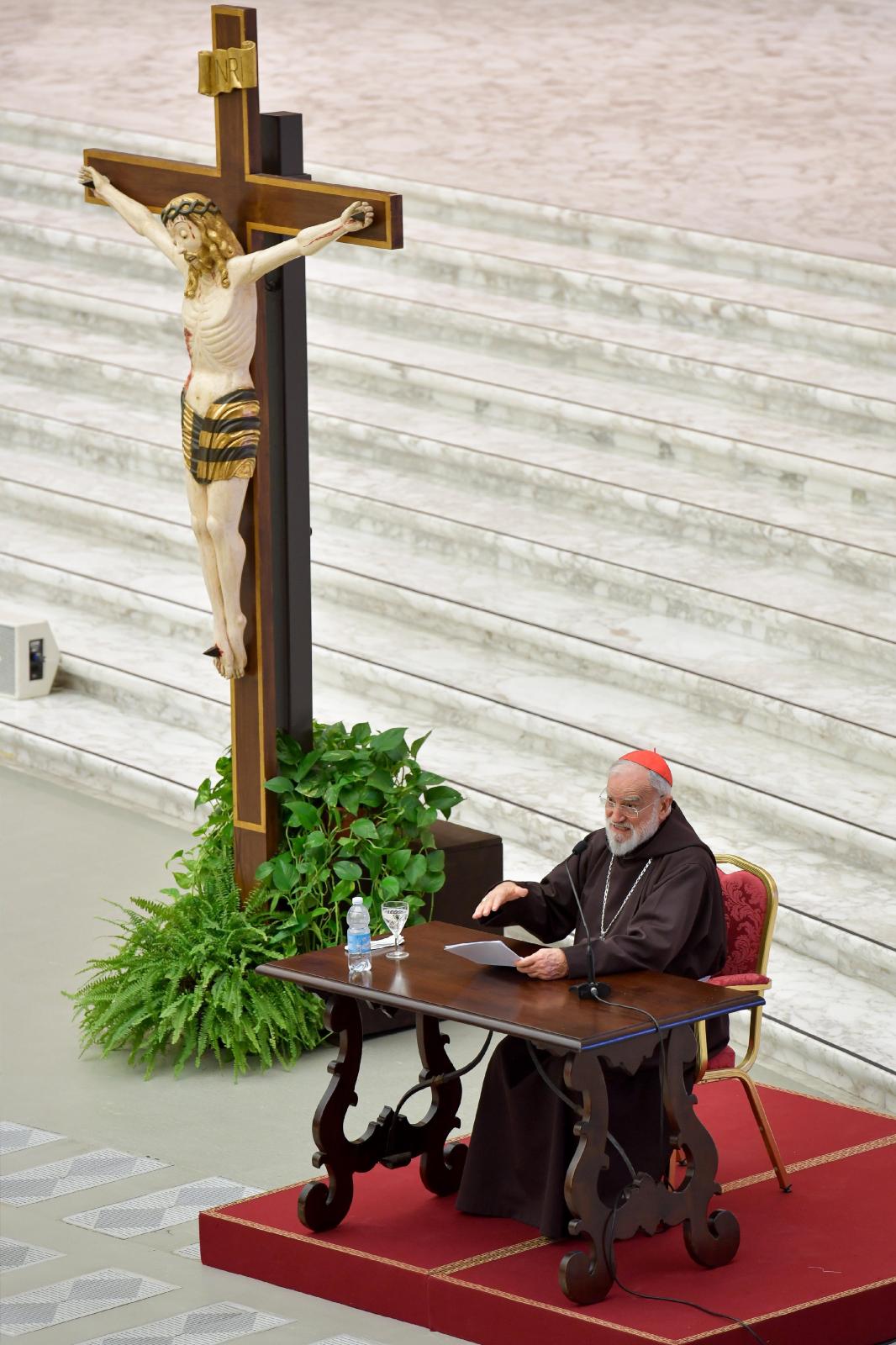Woe to those who end up in media ‘meat grinder,’ papal preacher says
VATICAN CITY (CNS) — The media and social networks can be crueler than wild beasts, the preacher of the papal household told top Vatican officials and Vatican employees.
“When they point out the distortions of society or of the church,” he said, then “they deserve all the respect and esteem,” Cardinal Raniero Cantalamessa said Feb. 23, offering his first Lenten meditation of 2024 in the Paul VI Audience Hall.
But there should be no praise when “they attack someone out of bias, simply because he does not belong to their side” or when they are driven by “malice and with destructive, rather than constructive, intent,” the Capuchin friar said.
The reflection came after Pope Francis and members of the Roman Curia suspended their usual activities to participate in a week of personal spiritual reflection for the beginning of Lent Feb. 18-23. A number of chairs reserved for curial officials and Pope Francis were empty.
“Unfortunately, today there exists in society teeth that grind without mercy, more cruelly” than the teeth of wild beasts, Cardinal Cantalamessa said. “They are the teeth of the media and the so-called social networks.”
“Unfortunate indeed is whoever ends up in this meat grinder today, be it a layperson or clergy!” he said.
“In this case, it is legitimate and necessary to assert one’s reasons in the appropriate forums, and if this is not possible, or it is seen that it is of no use, all that remains for a believer is to join Christ scourged, crowned with thorns, spit upon,” he said.
“It is a difficult and painful thing to say the least, especially if one’s natural or religious family is involved,” he said. “But the grace of God can make — and often has made — all of this an opportunity for purification and sanctification.”
“It’s about having faith that, in the end, as happened with Jesus, the truth will triumph over lies. And the triumph will be better served, perhaps, with silence than with the most aggressive self-defense,” he said.
The papal preacher said he would dedicate each of his five Lenten reflections to five of the seven “I am” declarations Jesus revealed in the Gospel of John, starting with “I am the bread of life.”
“How did he, Jesus, become the bread of life for us?” Cardinal Cantalamessa asked.
Jesus provided the answer in the Gospel of John (12:24) when he said, “Amen, amen, I say to you, unless a grain of wheat falls to the ground and dies, it remains just a grain of wheat; but if it dies, it produces much fruit,” the cardinal said.
The image of grain falling to the ground and dying, he said, indicates not only Jesus’ destiny, but also “that of every one of his true disciples.”
On his way to Rome, St. Ignatius of Antioch wrote how he was willing to become “food for the wild beasts, for they are my way to God. I am God’s wheat and shall be ground by their teeth so that I may become Christ’s pure bread,” the cardinal said, quoting the saint.
“This has something to say to us, too,” the cardinal said. “Each of us has, in our environment, these teeth of wild beasts that grind us” given that — quoting St. Augustine — human beings are “vessels of clay that are damaged by the slightest nick.”
“We must learn to make this situation a means of sanctification and not of hardening of the heart, hatred and complaint,” Cardinal Cantalamessa said.
“There are many opportunities not to be wasted if we, too, want to be ground to become God’s flour, and everyone must identify and sanctify what is offered to him in his place of service,” he said.
“One opportunity is to accept being contradicted, to give up justifying oneself, and to always want to be right when this is not required by the importance of the matter,” he said.
The other is “to put up with someone whose character, way of speaking or acting gets on our nerves, and to do so without ourselves becoming irritated internally, thinking, rather, that we too are perhaps such a person for someone,” he said.
